HRM Analysis: Job Satisfaction Factors & Impact of Job Dissatisfaction
VerifiedAdded on 2023/06/15
|10
|2604
|145
Essay
AI Summary
This essay examines the factors that contribute to job satisfaction and evaluates the organizational impact of job dissatisfaction. It begins by defining job satisfaction and its importance in reducing turnover and increasing productivity. The essay then explores various causes of job satisfaction, including work culture, job design, rewards, fairness, growth opportunities, leadership, personal interests, intelligence, and a stress-free work environment. Furthermore, it analyzes the negative impacts of job dissatisfaction on organizations, such as decreased productivity, loss of profits, poor customer service, increased employee turnover, and damage to the organization's reputation. The essay concludes that while money is a factor, other elements are crucial for job satisfaction and that addressing dissatisfaction is vital for organizational success.
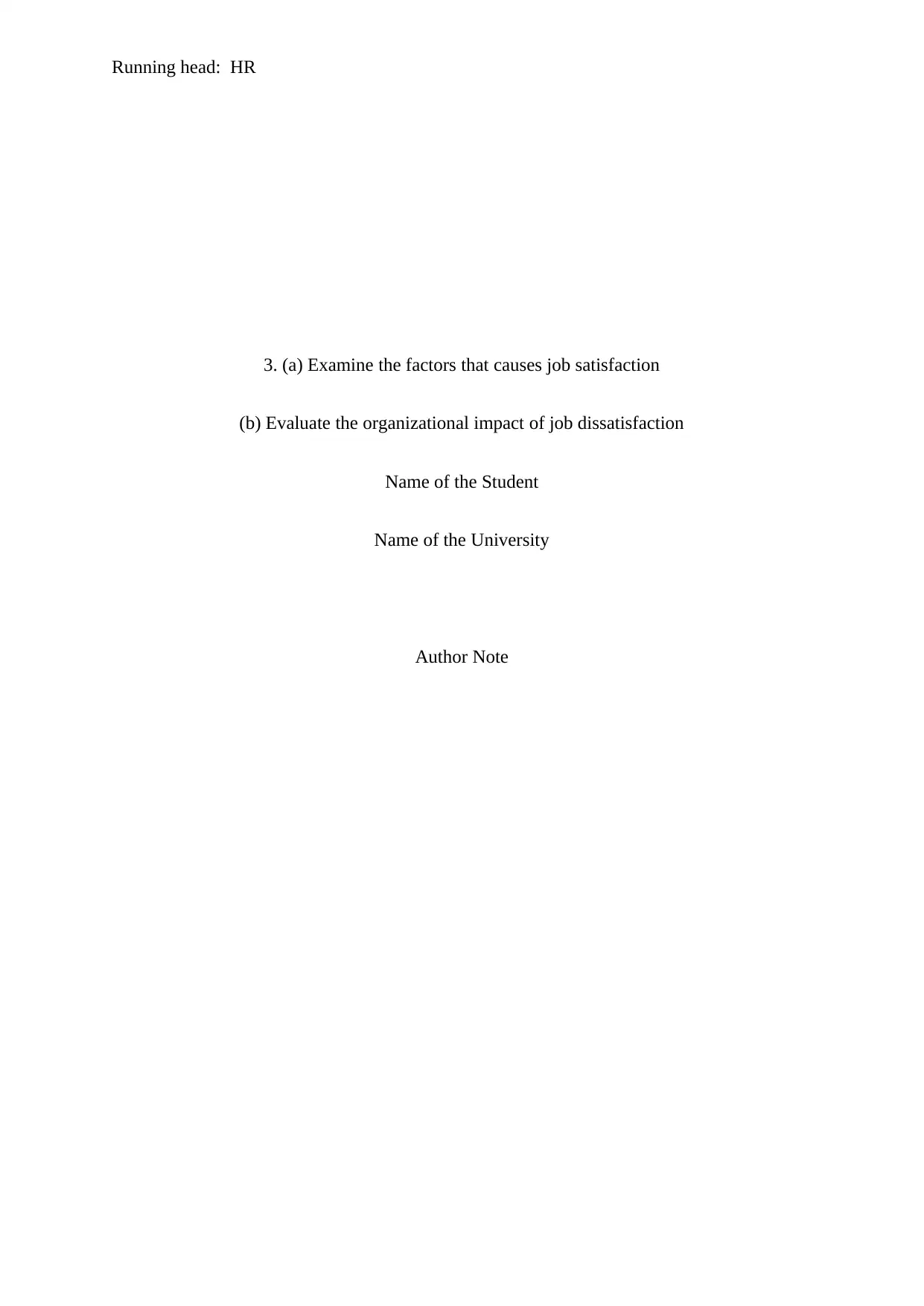
Running head: HR
3. (a) Examine the factors that causes job satisfaction
(b) Evaluate the organizational impact of job dissatisfaction
Name of the Student
Name of the University
Author Note
3. (a) Examine the factors that causes job satisfaction
(b) Evaluate the organizational impact of job dissatisfaction
Name of the Student
Name of the University
Author Note
Paraphrase This Document
Need a fresh take? Get an instant paraphrase of this document with our AI Paraphraser
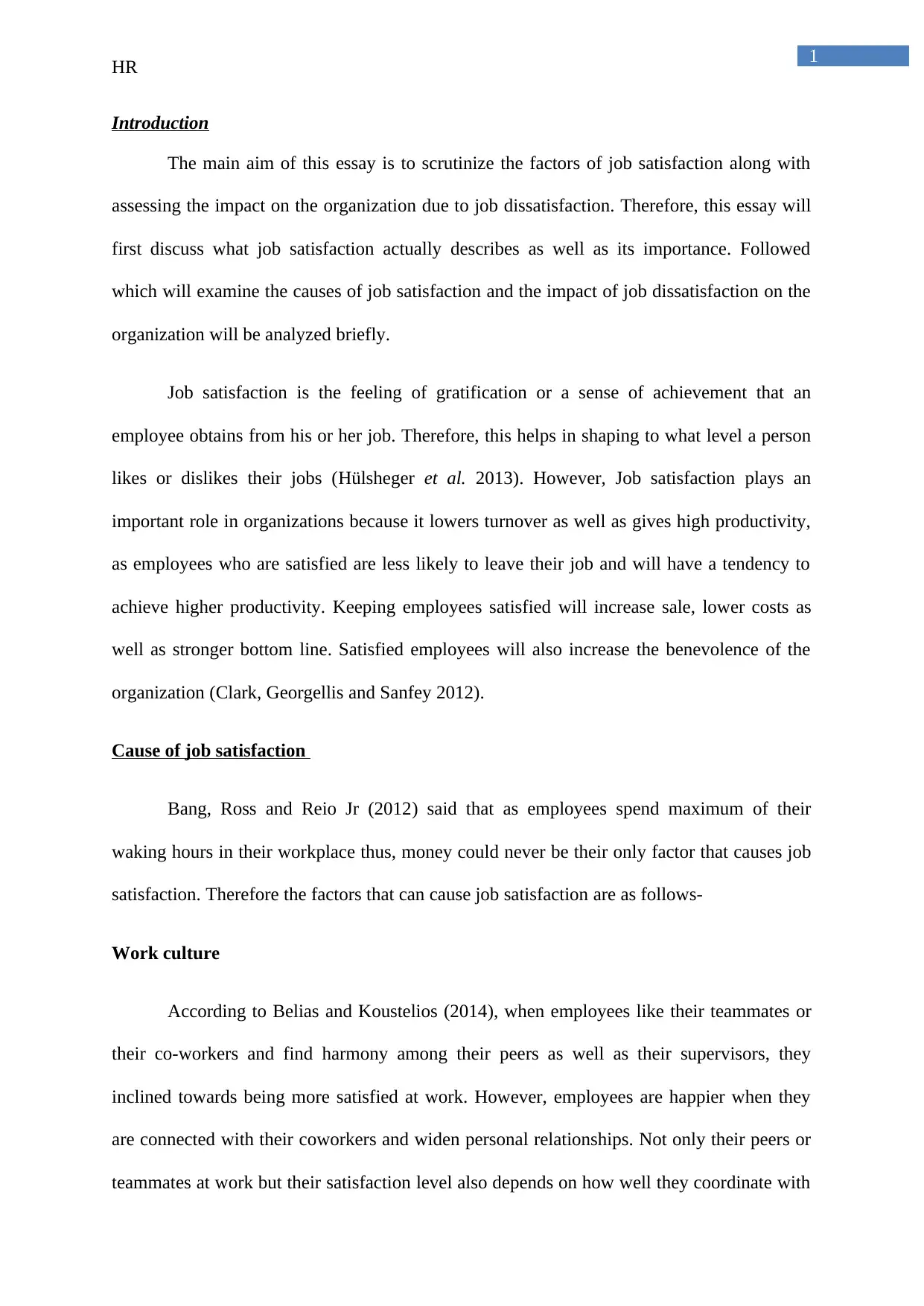
1
HR
Introduction
The main aim of this essay is to scrutinize the factors of job satisfaction along with
assessing the impact on the organization due to job dissatisfaction. Therefore, this essay will
first discuss what job satisfaction actually describes as well as its importance. Followed
which will examine the causes of job satisfaction and the impact of job dissatisfaction on the
organization will be analyzed briefly.
Job satisfaction is the feeling of gratification or a sense of achievement that an
employee obtains from his or her job. Therefore, this helps in shaping to what level a person
likes or dislikes their jobs (Hülsheger et al. 2013). However, Job satisfaction plays an
important role in organizations because it lowers turnover as well as gives high productivity,
as employees who are satisfied are less likely to leave their job and will have a tendency to
achieve higher productivity. Keeping employees satisfied will increase sale, lower costs as
well as stronger bottom line. Satisfied employees will also increase the benevolence of the
organization (Clark, Georgellis and Sanfey 2012).
Cause of job satisfaction
Bang, Ross and Reio Jr (2012) said that as employees spend maximum of their
waking hours in their workplace thus, money could never be their only factor that causes job
satisfaction. Therefore the factors that can cause job satisfaction are as follows-
Work culture
According to Belias and Koustelios (2014), when employees like their teammates or
their co-workers and find harmony among their peers as well as their supervisors, they
inclined towards being more satisfied at work. However, employees are happier when they
are connected with their coworkers and widen personal relationships. Not only their peers or
teammates at work but their satisfaction level also depends on how well they coordinate with
HR
Introduction
The main aim of this essay is to scrutinize the factors of job satisfaction along with
assessing the impact on the organization due to job dissatisfaction. Therefore, this essay will
first discuss what job satisfaction actually describes as well as its importance. Followed
which will examine the causes of job satisfaction and the impact of job dissatisfaction on the
organization will be analyzed briefly.
Job satisfaction is the feeling of gratification or a sense of achievement that an
employee obtains from his or her job. Therefore, this helps in shaping to what level a person
likes or dislikes their jobs (Hülsheger et al. 2013). However, Job satisfaction plays an
important role in organizations because it lowers turnover as well as gives high productivity,
as employees who are satisfied are less likely to leave their job and will have a tendency to
achieve higher productivity. Keeping employees satisfied will increase sale, lower costs as
well as stronger bottom line. Satisfied employees will also increase the benevolence of the
organization (Clark, Georgellis and Sanfey 2012).
Cause of job satisfaction
Bang, Ross and Reio Jr (2012) said that as employees spend maximum of their
waking hours in their workplace thus, money could never be their only factor that causes job
satisfaction. Therefore the factors that can cause job satisfaction are as follows-
Work culture
According to Belias and Koustelios (2014), when employees like their teammates or
their co-workers and find harmony among their peers as well as their supervisors, they
inclined towards being more satisfied at work. However, employees are happier when they
are connected with their coworkers and widen personal relationships. Not only their peers or
teammates at work but their satisfaction level also depends on how well they coordinate with
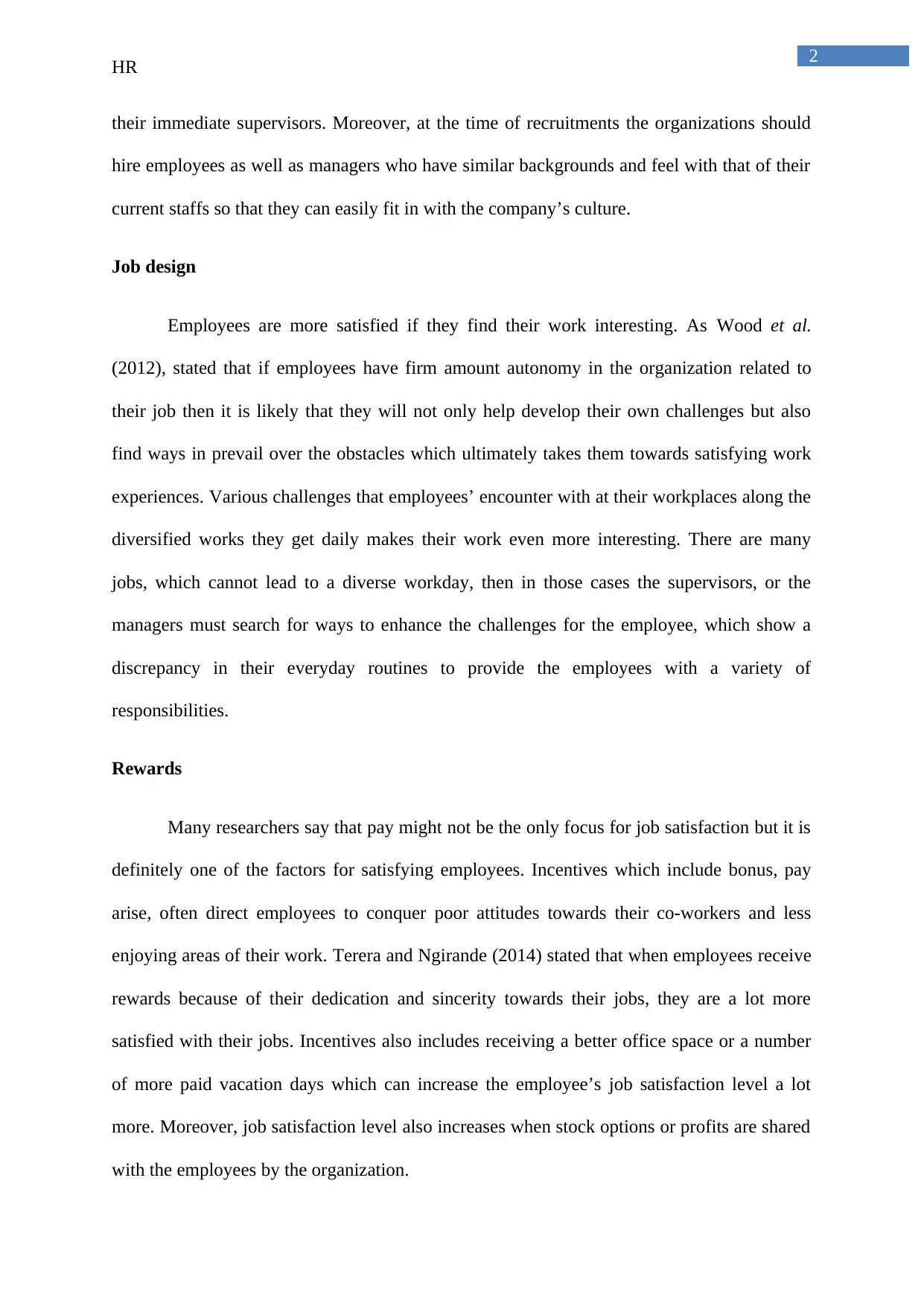
2
HR
their immediate supervisors. Moreover, at the time of recruitments the organizations should
hire employees as well as managers who have similar backgrounds and feel with that of their
current staffs so that they can easily fit in with the company’s culture.
Job design
Employees are more satisfied if they find their work interesting. As Wood et al.
(2012), stated that if employees have firm amount autonomy in the organization related to
their job then it is likely that they will not only help develop their own challenges but also
find ways in prevail over the obstacles which ultimately takes them towards satisfying work
experiences. Various challenges that employees’ encounter with at their workplaces along the
diversified works they get daily makes their work even more interesting. There are many
jobs, which cannot lead to a diverse workday, then in those cases the supervisors, or the
managers must search for ways to enhance the challenges for the employee, which show a
discrepancy in their everyday routines to provide the employees with a variety of
responsibilities.
Rewards
Many researchers say that pay might not be the only focus for job satisfaction but it is
definitely one of the factors for satisfying employees. Incentives which include bonus, pay
arise, often direct employees to conquer poor attitudes towards their co-workers and less
enjoying areas of their work. Terera and Ngirande (2014) stated that when employees receive
rewards because of their dedication and sincerity towards their jobs, they are a lot more
satisfied with their jobs. Incentives also includes receiving a better office space or a number
of more paid vacation days which can increase the employee’s job satisfaction level a lot
more. Moreover, job satisfaction level also increases when stock options or profits are shared
with the employees by the organization.
HR
their immediate supervisors. Moreover, at the time of recruitments the organizations should
hire employees as well as managers who have similar backgrounds and feel with that of their
current staffs so that they can easily fit in with the company’s culture.
Job design
Employees are more satisfied if they find their work interesting. As Wood et al.
(2012), stated that if employees have firm amount autonomy in the organization related to
their job then it is likely that they will not only help develop their own challenges but also
find ways in prevail over the obstacles which ultimately takes them towards satisfying work
experiences. Various challenges that employees’ encounter with at their workplaces along the
diversified works they get daily makes their work even more interesting. There are many
jobs, which cannot lead to a diverse workday, then in those cases the supervisors, or the
managers must search for ways to enhance the challenges for the employee, which show a
discrepancy in their everyday routines to provide the employees with a variety of
responsibilities.
Rewards
Many researchers say that pay might not be the only focus for job satisfaction but it is
definitely one of the factors for satisfying employees. Incentives which include bonus, pay
arise, often direct employees to conquer poor attitudes towards their co-workers and less
enjoying areas of their work. Terera and Ngirande (2014) stated that when employees receive
rewards because of their dedication and sincerity towards their jobs, they are a lot more
satisfied with their jobs. Incentives also includes receiving a better office space or a number
of more paid vacation days which can increase the employee’s job satisfaction level a lot
more. Moreover, job satisfaction level also increases when stock options or profits are shared
with the employees by the organization.
⊘ This is a preview!⊘
Do you want full access?
Subscribe today to unlock all pages.

Trusted by 1+ million students worldwide
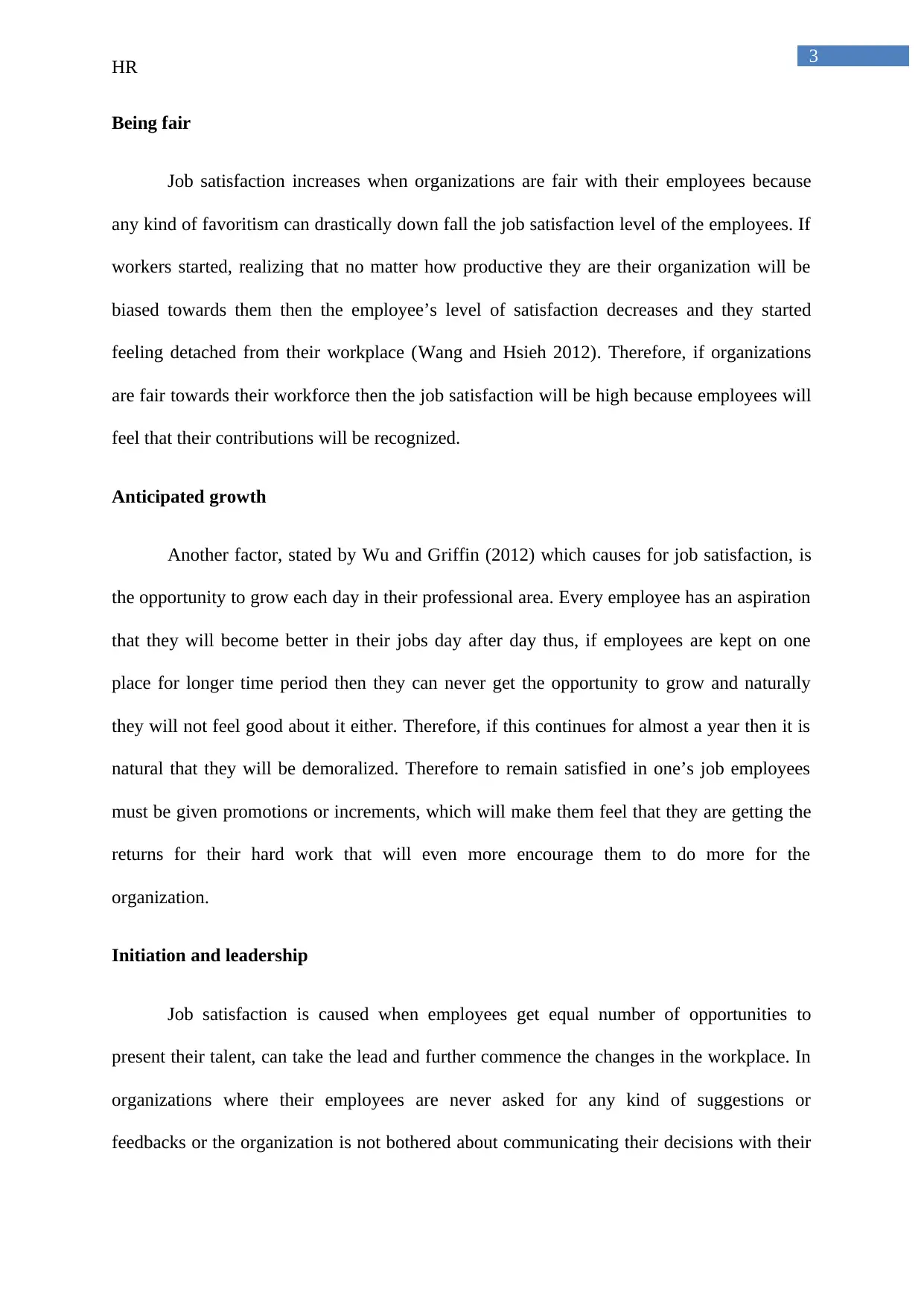
3
HR
Being fair
Job satisfaction increases when organizations are fair with their employees because
any kind of favoritism can drastically down fall the job satisfaction level of the employees. If
workers started, realizing that no matter how productive they are their organization will be
biased towards them then the employee’s level of satisfaction decreases and they started
feeling detached from their workplace (Wang and Hsieh 2012). Therefore, if organizations
are fair towards their workforce then the job satisfaction will be high because employees will
feel that their contributions will be recognized.
Anticipated growth
Another factor, stated by Wu and Griffin (2012) which causes for job satisfaction, is
the opportunity to grow each day in their professional area. Every employee has an aspiration
that they will become better in their jobs day after day thus, if employees are kept on one
place for longer time period then they can never get the opportunity to grow and naturally
they will not feel good about it either. Therefore, if this continues for almost a year then it is
natural that they will be demoralized. Therefore to remain satisfied in one’s job employees
must be given promotions or increments, which will make them feel that they are getting the
returns for their hard work that will even more encourage them to do more for the
organization.
Initiation and leadership
Job satisfaction is caused when employees get equal number of opportunities to
present their talent, can take the lead and further commence the changes in the workplace. In
organizations where their employees are never asked for any kind of suggestions or
feedbacks or the organization is not bothered about communicating their decisions with their
HR
Being fair
Job satisfaction increases when organizations are fair with their employees because
any kind of favoritism can drastically down fall the job satisfaction level of the employees. If
workers started, realizing that no matter how productive they are their organization will be
biased towards them then the employee’s level of satisfaction decreases and they started
feeling detached from their workplace (Wang and Hsieh 2012). Therefore, if organizations
are fair towards their workforce then the job satisfaction will be high because employees will
feel that their contributions will be recognized.
Anticipated growth
Another factor, stated by Wu and Griffin (2012) which causes for job satisfaction, is
the opportunity to grow each day in their professional area. Every employee has an aspiration
that they will become better in their jobs day after day thus, if employees are kept on one
place for longer time period then they can never get the opportunity to grow and naturally
they will not feel good about it either. Therefore, if this continues for almost a year then it is
natural that they will be demoralized. Therefore to remain satisfied in one’s job employees
must be given promotions or increments, which will make them feel that they are getting the
returns for their hard work that will even more encourage them to do more for the
organization.
Initiation and leadership
Job satisfaction is caused when employees get equal number of opportunities to
present their talent, can take the lead and further commence the changes in the workplace. In
organizations where their employees are never asked for any kind of suggestions or
feedbacks or the organization is not bothered about communicating their decisions with their
Paraphrase This Document
Need a fresh take? Get an instant paraphrase of this document with our AI Paraphraser
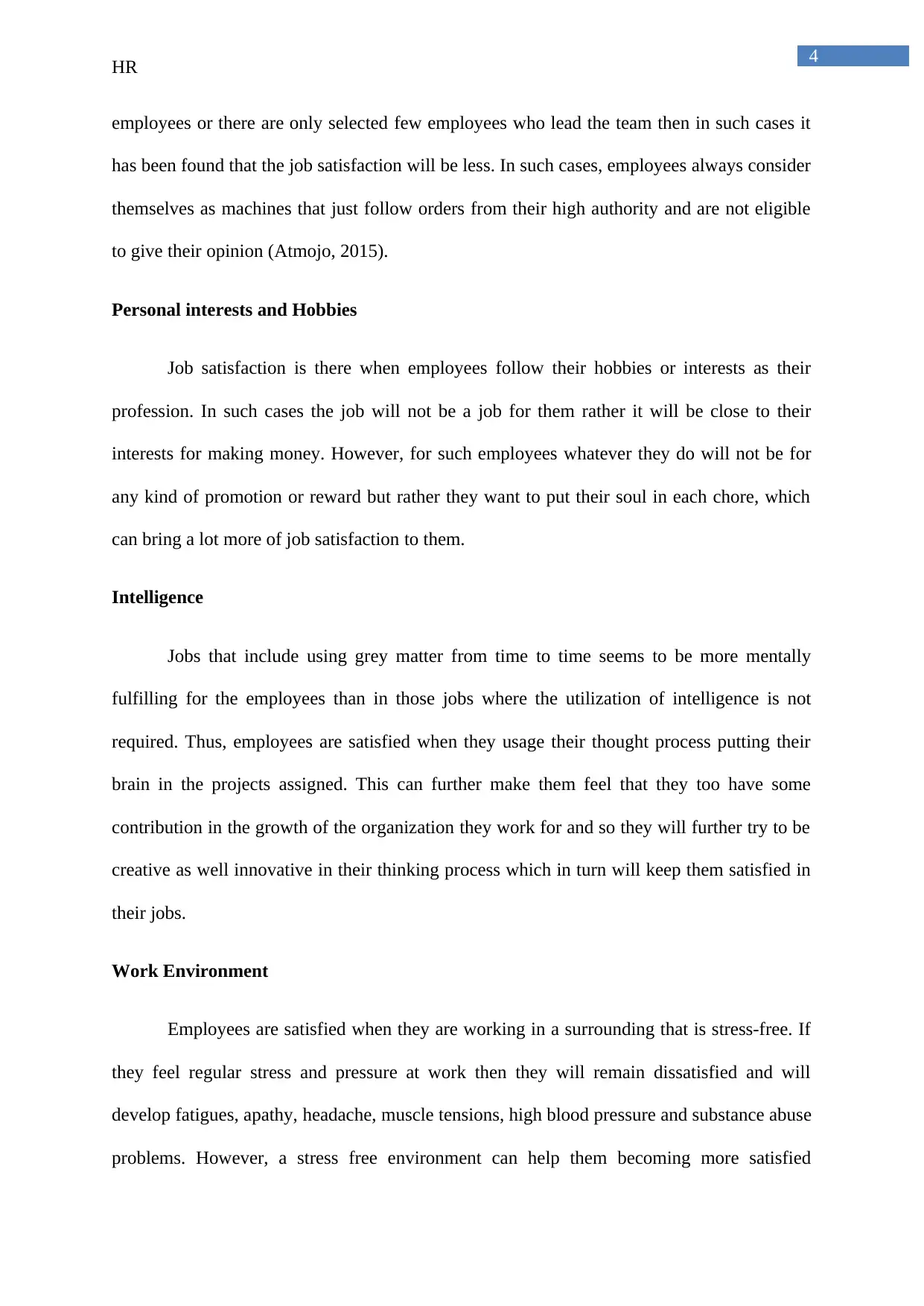
4
HR
employees or there are only selected few employees who lead the team then in such cases it
has been found that the job satisfaction will be less. In such cases, employees always consider
themselves as machines that just follow orders from their high authority and are not eligible
to give their opinion (Atmojo, 2015).
Personal interests and Hobbies
Job satisfaction is there when employees follow their hobbies or interests as their
profession. In such cases the job will not be a job for them rather it will be close to their
interests for making money. However, for such employees whatever they do will not be for
any kind of promotion or reward but rather they want to put their soul in each chore, which
can bring a lot more of job satisfaction to them.
Intelligence
Jobs that include using grey matter from time to time seems to be more mentally
fulfilling for the employees than in those jobs where the utilization of intelligence is not
required. Thus, employees are satisfied when they usage their thought process putting their
brain in the projects assigned. This can further make them feel that they too have some
contribution in the growth of the organization they work for and so they will further try to be
creative as well innovative in their thinking process which in turn will keep them satisfied in
their jobs.
Work Environment
Employees are satisfied when they are working in a surrounding that is stress-free. If
they feel regular stress and pressure at work then they will remain dissatisfied and will
develop fatigues, apathy, headache, muscle tensions, high blood pressure and substance abuse
problems. However, a stress free environment can help them becoming more satisfied
HR
employees or there are only selected few employees who lead the team then in such cases it
has been found that the job satisfaction will be less. In such cases, employees always consider
themselves as machines that just follow orders from their high authority and are not eligible
to give their opinion (Atmojo, 2015).
Personal interests and Hobbies
Job satisfaction is there when employees follow their hobbies or interests as their
profession. In such cases the job will not be a job for them rather it will be close to their
interests for making money. However, for such employees whatever they do will not be for
any kind of promotion or reward but rather they want to put their soul in each chore, which
can bring a lot more of job satisfaction to them.
Intelligence
Jobs that include using grey matter from time to time seems to be more mentally
fulfilling for the employees than in those jobs where the utilization of intelligence is not
required. Thus, employees are satisfied when they usage their thought process putting their
brain in the projects assigned. This can further make them feel that they too have some
contribution in the growth of the organization they work for and so they will further try to be
creative as well innovative in their thinking process which in turn will keep them satisfied in
their jobs.
Work Environment
Employees are satisfied when they are working in a surrounding that is stress-free. If
they feel regular stress and pressure at work then they will remain dissatisfied and will
develop fatigues, apathy, headache, muscle tensions, high blood pressure and substance abuse
problems. However, a stress free environment can help them becoming more satisfied
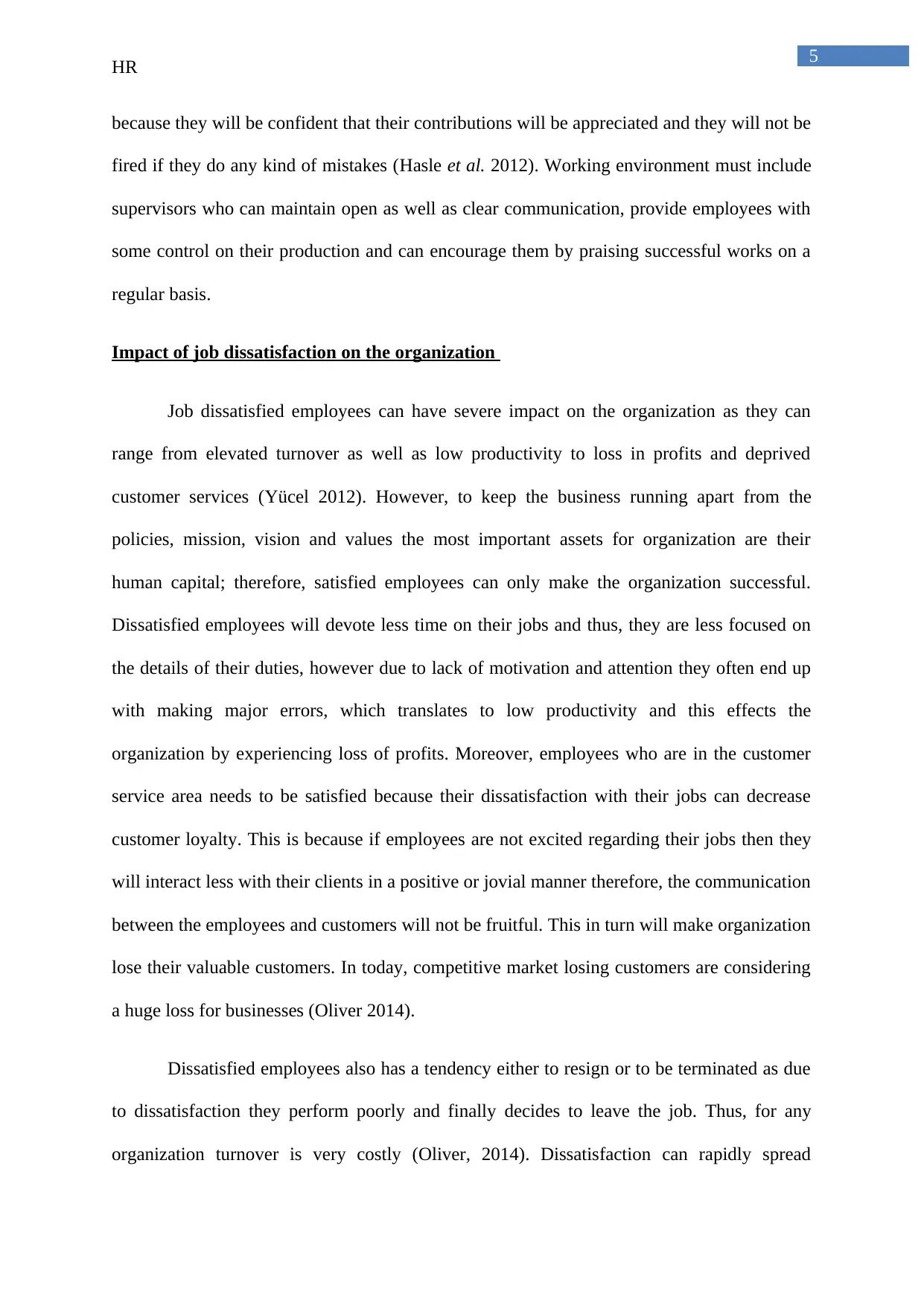
5
HR
because they will be confident that their contributions will be appreciated and they will not be
fired if they do any kind of mistakes (Hasle et al. 2012). Working environment must include
supervisors who can maintain open as well as clear communication, provide employees with
some control on their production and can encourage them by praising successful works on a
regular basis.
Impact of job dissatisfaction on the organization
Job dissatisfied employees can have severe impact on the organization as they can
range from elevated turnover as well as low productivity to loss in profits and deprived
customer services (Yücel 2012). However, to keep the business running apart from the
policies, mission, vision and values the most important assets for organization are their
human capital; therefore, satisfied employees can only make the organization successful.
Dissatisfied employees will devote less time on their jobs and thus, they are less focused on
the details of their duties, however due to lack of motivation and attention they often end up
with making major errors, which translates to low productivity and this effects the
organization by experiencing loss of profits. Moreover, employees who are in the customer
service area needs to be satisfied because their dissatisfaction with their jobs can decrease
customer loyalty. This is because if employees are not excited regarding their jobs then they
will interact less with their clients in a positive or jovial manner therefore, the communication
between the employees and customers will not be fruitful. This in turn will make organization
lose their valuable customers. In today, competitive market losing customers are considering
a huge loss for businesses (Oliver 2014).
Dissatisfied employees also has a tendency either to resign or to be terminated as due
to dissatisfaction they perform poorly and finally decides to leave the job. Thus, for any
organization turnover is very costly (Oliver, 2014). Dissatisfaction can rapidly spread
HR
because they will be confident that their contributions will be appreciated and they will not be
fired if they do any kind of mistakes (Hasle et al. 2012). Working environment must include
supervisors who can maintain open as well as clear communication, provide employees with
some control on their production and can encourage them by praising successful works on a
regular basis.
Impact of job dissatisfaction on the organization
Job dissatisfied employees can have severe impact on the organization as they can
range from elevated turnover as well as low productivity to loss in profits and deprived
customer services (Yücel 2012). However, to keep the business running apart from the
policies, mission, vision and values the most important assets for organization are their
human capital; therefore, satisfied employees can only make the organization successful.
Dissatisfied employees will devote less time on their jobs and thus, they are less focused on
the details of their duties, however due to lack of motivation and attention they often end up
with making major errors, which translates to low productivity and this effects the
organization by experiencing loss of profits. Moreover, employees who are in the customer
service area needs to be satisfied because their dissatisfaction with their jobs can decrease
customer loyalty. This is because if employees are not excited regarding their jobs then they
will interact less with their clients in a positive or jovial manner therefore, the communication
between the employees and customers will not be fruitful. This in turn will make organization
lose their valuable customers. In today, competitive market losing customers are considering
a huge loss for businesses (Oliver 2014).
Dissatisfied employees also has a tendency either to resign or to be terminated as due
to dissatisfaction they perform poorly and finally decides to leave the job. Thus, for any
organization turnover is very costly (Oliver, 2014). Dissatisfaction can rapidly spread
⊘ This is a preview!⊘
Do you want full access?
Subscribe today to unlock all pages.

Trusted by 1+ million students worldwide
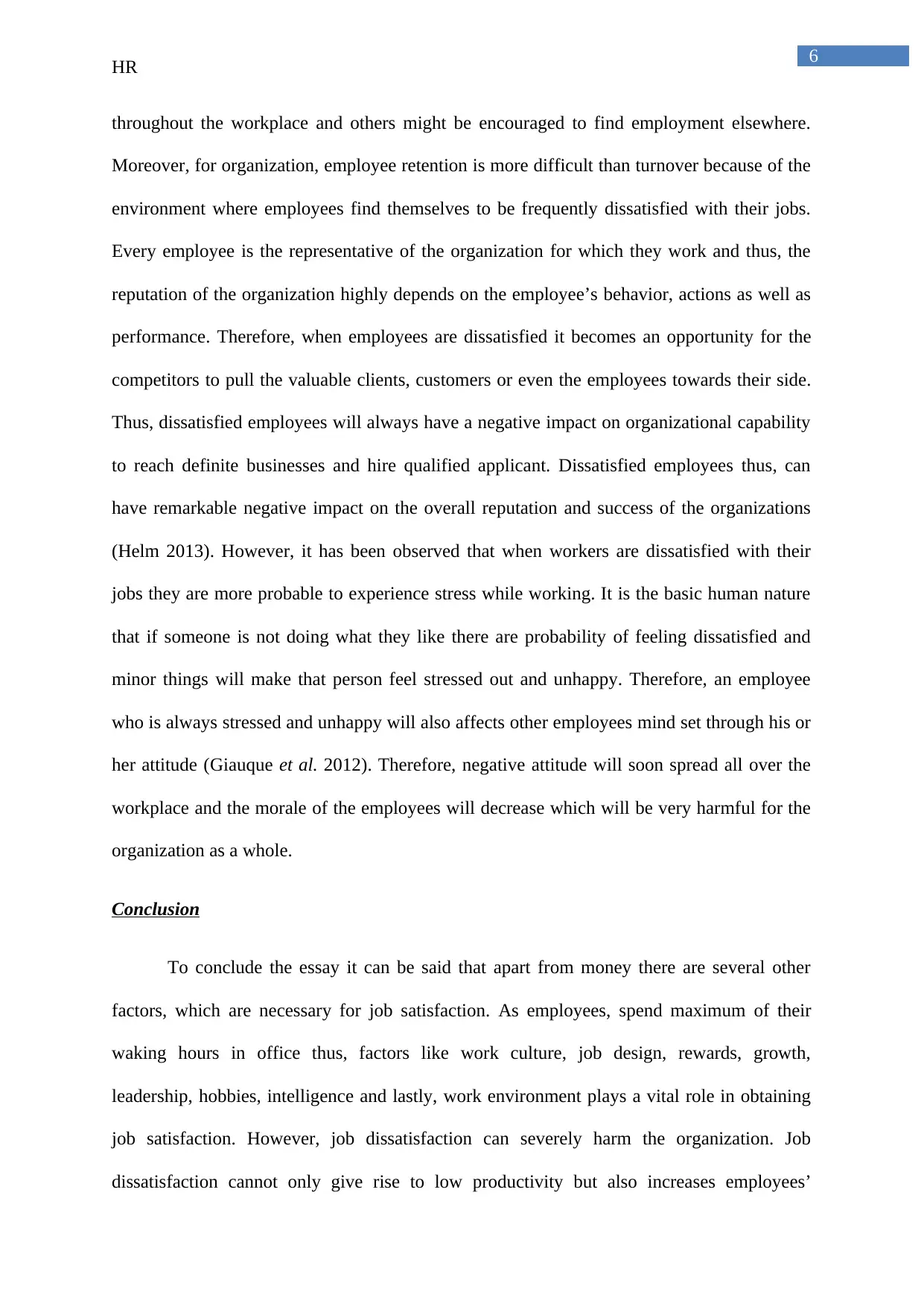
6
HR
throughout the workplace and others might be encouraged to find employment elsewhere.
Moreover, for organization, employee retention is more difficult than turnover because of the
environment where employees find themselves to be frequently dissatisfied with their jobs.
Every employee is the representative of the organization for which they work and thus, the
reputation of the organization highly depends on the employee’s behavior, actions as well as
performance. Therefore, when employees are dissatisfied it becomes an opportunity for the
competitors to pull the valuable clients, customers or even the employees towards their side.
Thus, dissatisfied employees will always have a negative impact on organizational capability
to reach definite businesses and hire qualified applicant. Dissatisfied employees thus, can
have remarkable negative impact on the overall reputation and success of the organizations
(Helm 2013). However, it has been observed that when workers are dissatisfied with their
jobs they are more probable to experience stress while working. It is the basic human nature
that if someone is not doing what they like there are probability of feeling dissatisfied and
minor things will make that person feel stressed out and unhappy. Therefore, an employee
who is always stressed and unhappy will also affects other employees mind set through his or
her attitude (Giauque et al. 2012). Therefore, negative attitude will soon spread all over the
workplace and the morale of the employees will decrease which will be very harmful for the
organization as a whole.
Conclusion
To conclude the essay it can be said that apart from money there are several other
factors, which are necessary for job satisfaction. As employees, spend maximum of their
waking hours in office thus, factors like work culture, job design, rewards, growth,
leadership, hobbies, intelligence and lastly, work environment plays a vital role in obtaining
job satisfaction. However, job dissatisfaction can severely harm the organization. Job
dissatisfaction cannot only give rise to low productivity but also increases employees’
HR
throughout the workplace and others might be encouraged to find employment elsewhere.
Moreover, for organization, employee retention is more difficult than turnover because of the
environment where employees find themselves to be frequently dissatisfied with their jobs.
Every employee is the representative of the organization for which they work and thus, the
reputation of the organization highly depends on the employee’s behavior, actions as well as
performance. Therefore, when employees are dissatisfied it becomes an opportunity for the
competitors to pull the valuable clients, customers or even the employees towards their side.
Thus, dissatisfied employees will always have a negative impact on organizational capability
to reach definite businesses and hire qualified applicant. Dissatisfied employees thus, can
have remarkable negative impact on the overall reputation and success of the organizations
(Helm 2013). However, it has been observed that when workers are dissatisfied with their
jobs they are more probable to experience stress while working. It is the basic human nature
that if someone is not doing what they like there are probability of feeling dissatisfied and
minor things will make that person feel stressed out and unhappy. Therefore, an employee
who is always stressed and unhappy will also affects other employees mind set through his or
her attitude (Giauque et al. 2012). Therefore, negative attitude will soon spread all over the
workplace and the morale of the employees will decrease which will be very harmful for the
organization as a whole.
Conclusion
To conclude the essay it can be said that apart from money there are several other
factors, which are necessary for job satisfaction. As employees, spend maximum of their
waking hours in office thus, factors like work culture, job design, rewards, growth,
leadership, hobbies, intelligence and lastly, work environment plays a vital role in obtaining
job satisfaction. However, job dissatisfaction can severely harm the organization. Job
dissatisfaction cannot only give rise to low productivity but also increases employees’
Paraphrase This Document
Need a fresh take? Get an instant paraphrase of this document with our AI Paraphraser

7
HR
turnover, loss in profits and underprivileged customer service. Moreover, employees who are
dissatisfied will become stressed at minor issues and will affect other employees through
their attitude.
HR
turnover, loss in profits and underprivileged customer service. Moreover, employees who are
dissatisfied will become stressed at minor issues and will affect other employees through
their attitude.
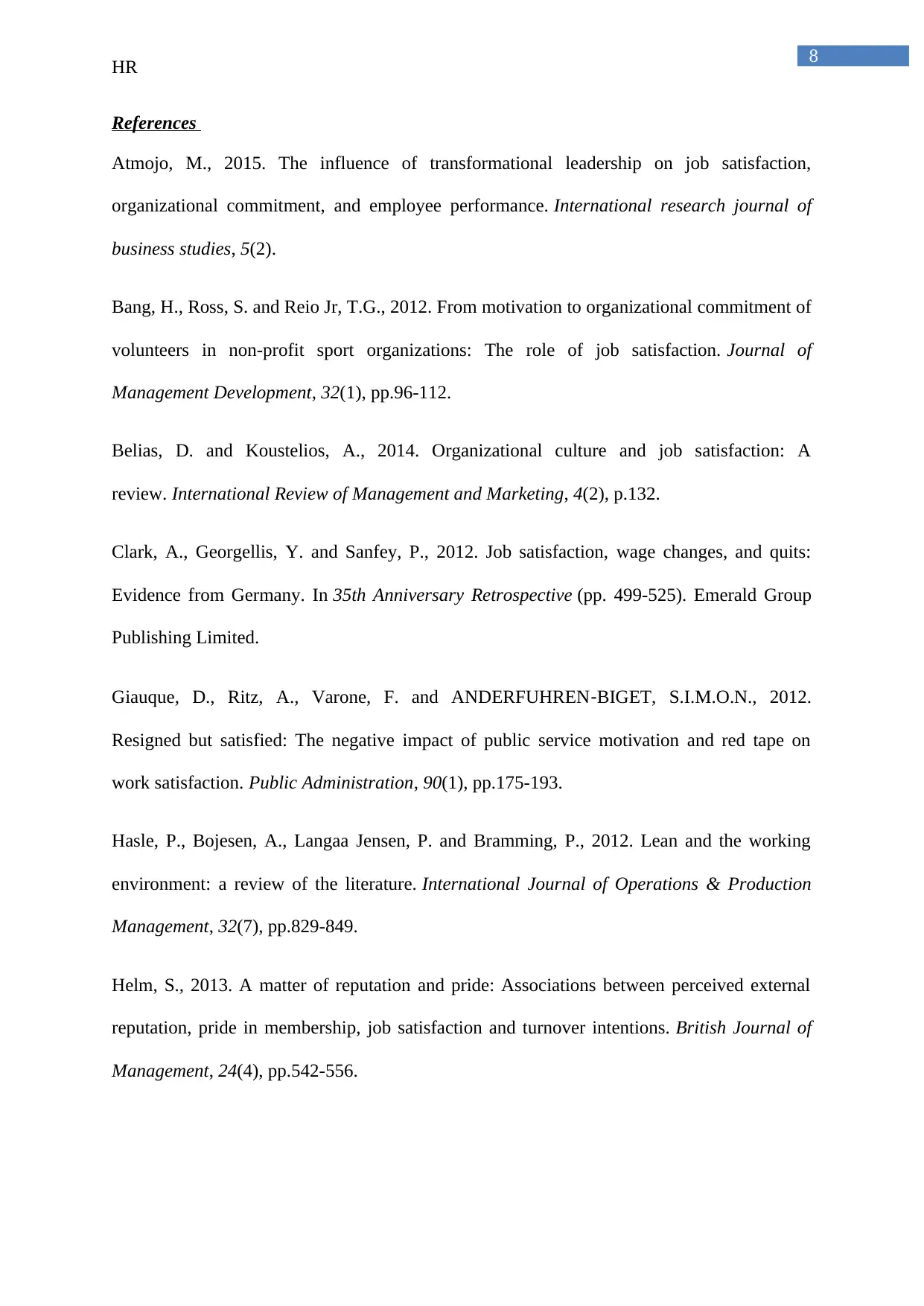
8
HR
References
Atmojo, M., 2015. The influence of transformational leadership on job satisfaction,
organizational commitment, and employee performance. International research journal of
business studies, 5(2).
Bang, H., Ross, S. and Reio Jr, T.G., 2012. From motivation to organizational commitment of
volunteers in non-profit sport organizations: The role of job satisfaction. Journal of
Management Development, 32(1), pp.96-112.
Belias, D. and Koustelios, A., 2014. Organizational culture and job satisfaction: A
review. International Review of Management and Marketing, 4(2), p.132.
Clark, A., Georgellis, Y. and Sanfey, P., 2012. Job satisfaction, wage changes, and quits:
Evidence from Germany. In 35th Anniversary Retrospective (pp. 499-525). Emerald Group
Publishing Limited.
Giauque, D., Ritz, A., Varone, F. and ANDERFUHREN‐BIGET, S.I.M.O.N., 2012.
Resigned but satisfied: The negative impact of public service motivation and red tape on
work satisfaction. Public Administration, 90(1), pp.175-193.
Hasle, P., Bojesen, A., Langaa Jensen, P. and Bramming, P., 2012. Lean and the working
environment: a review of the literature. International Journal of Operations & Production
Management, 32(7), pp.829-849.
Helm, S., 2013. A matter of reputation and pride: Associations between perceived external
reputation, pride in membership, job satisfaction and turnover intentions. British Journal of
Management, 24(4), pp.542-556.
HR
References
Atmojo, M., 2015. The influence of transformational leadership on job satisfaction,
organizational commitment, and employee performance. International research journal of
business studies, 5(2).
Bang, H., Ross, S. and Reio Jr, T.G., 2012. From motivation to organizational commitment of
volunteers in non-profit sport organizations: The role of job satisfaction. Journal of
Management Development, 32(1), pp.96-112.
Belias, D. and Koustelios, A., 2014. Organizational culture and job satisfaction: A
review. International Review of Management and Marketing, 4(2), p.132.
Clark, A., Georgellis, Y. and Sanfey, P., 2012. Job satisfaction, wage changes, and quits:
Evidence from Germany. In 35th Anniversary Retrospective (pp. 499-525). Emerald Group
Publishing Limited.
Giauque, D., Ritz, A., Varone, F. and ANDERFUHREN‐BIGET, S.I.M.O.N., 2012.
Resigned but satisfied: The negative impact of public service motivation and red tape on
work satisfaction. Public Administration, 90(1), pp.175-193.
Hasle, P., Bojesen, A., Langaa Jensen, P. and Bramming, P., 2012. Lean and the working
environment: a review of the literature. International Journal of Operations & Production
Management, 32(7), pp.829-849.
Helm, S., 2013. A matter of reputation and pride: Associations between perceived external
reputation, pride in membership, job satisfaction and turnover intentions. British Journal of
Management, 24(4), pp.542-556.
⊘ This is a preview!⊘
Do you want full access?
Subscribe today to unlock all pages.

Trusted by 1+ million students worldwide
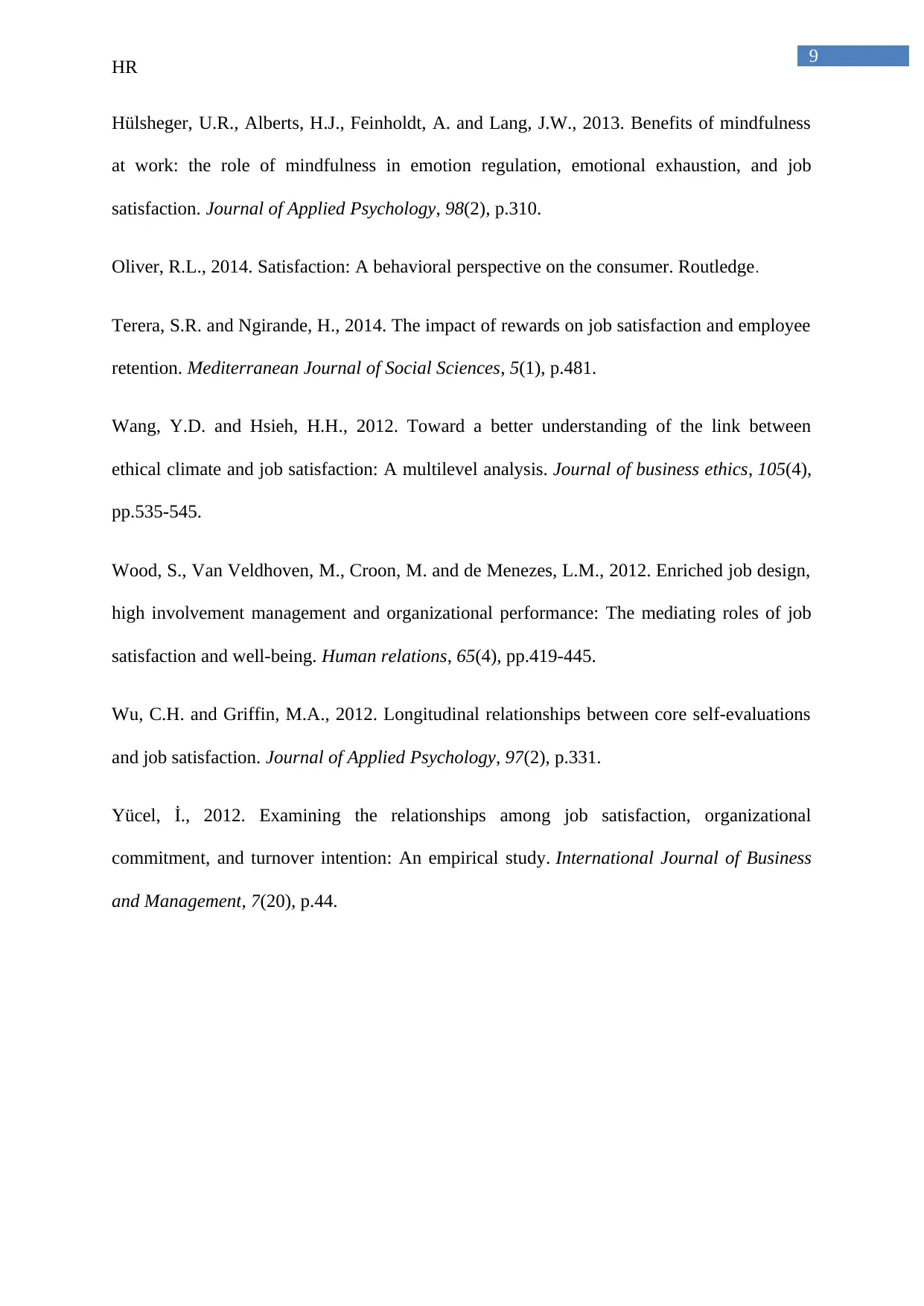
9
HR
Hülsheger, U.R., Alberts, H.J., Feinholdt, A. and Lang, J.W., 2013. Benefits of mindfulness
at work: the role of mindfulness in emotion regulation, emotional exhaustion, and job
satisfaction. Journal of Applied Psychology, 98(2), p.310.
Oliver, R.L., 2014. Satisfaction: A behavioral perspective on the consumer. Routledge.
Terera, S.R. and Ngirande, H., 2014. The impact of rewards on job satisfaction and employee
retention. Mediterranean Journal of Social Sciences, 5(1), p.481.
Wang, Y.D. and Hsieh, H.H., 2012. Toward a better understanding of the link between
ethical climate and job satisfaction: A multilevel analysis. Journal of business ethics, 105(4),
pp.535-545.
Wood, S., Van Veldhoven, M., Croon, M. and de Menezes, L.M., 2012. Enriched job design,
high involvement management and organizational performance: The mediating roles of job
satisfaction and well-being. Human relations, 65(4), pp.419-445.
Wu, C.H. and Griffin, M.A., 2012. Longitudinal relationships between core self-evaluations
and job satisfaction. Journal of Applied Psychology, 97(2), p.331.
Yücel, İ., 2012. Examining the relationships among job satisfaction, organizational
commitment, and turnover intention: An empirical study. International Journal of Business
and Management, 7(20), p.44.
HR
Hülsheger, U.R., Alberts, H.J., Feinholdt, A. and Lang, J.W., 2013. Benefits of mindfulness
at work: the role of mindfulness in emotion regulation, emotional exhaustion, and job
satisfaction. Journal of Applied Psychology, 98(2), p.310.
Oliver, R.L., 2014. Satisfaction: A behavioral perspective on the consumer. Routledge.
Terera, S.R. and Ngirande, H., 2014. The impact of rewards on job satisfaction and employee
retention. Mediterranean Journal of Social Sciences, 5(1), p.481.
Wang, Y.D. and Hsieh, H.H., 2012. Toward a better understanding of the link between
ethical climate and job satisfaction: A multilevel analysis. Journal of business ethics, 105(4),
pp.535-545.
Wood, S., Van Veldhoven, M., Croon, M. and de Menezes, L.M., 2012. Enriched job design,
high involvement management and organizational performance: The mediating roles of job
satisfaction and well-being. Human relations, 65(4), pp.419-445.
Wu, C.H. and Griffin, M.A., 2012. Longitudinal relationships between core self-evaluations
and job satisfaction. Journal of Applied Psychology, 97(2), p.331.
Yücel, İ., 2012. Examining the relationships among job satisfaction, organizational
commitment, and turnover intention: An empirical study. International Journal of Business
and Management, 7(20), p.44.
1 out of 10
Related Documents
Your All-in-One AI-Powered Toolkit for Academic Success.
+13062052269
info@desklib.com
Available 24*7 on WhatsApp / Email
![[object Object]](/_next/static/media/star-bottom.7253800d.svg)
Unlock your academic potential
Copyright © 2020–2026 A2Z Services. All Rights Reserved. Developed and managed by ZUCOL.





